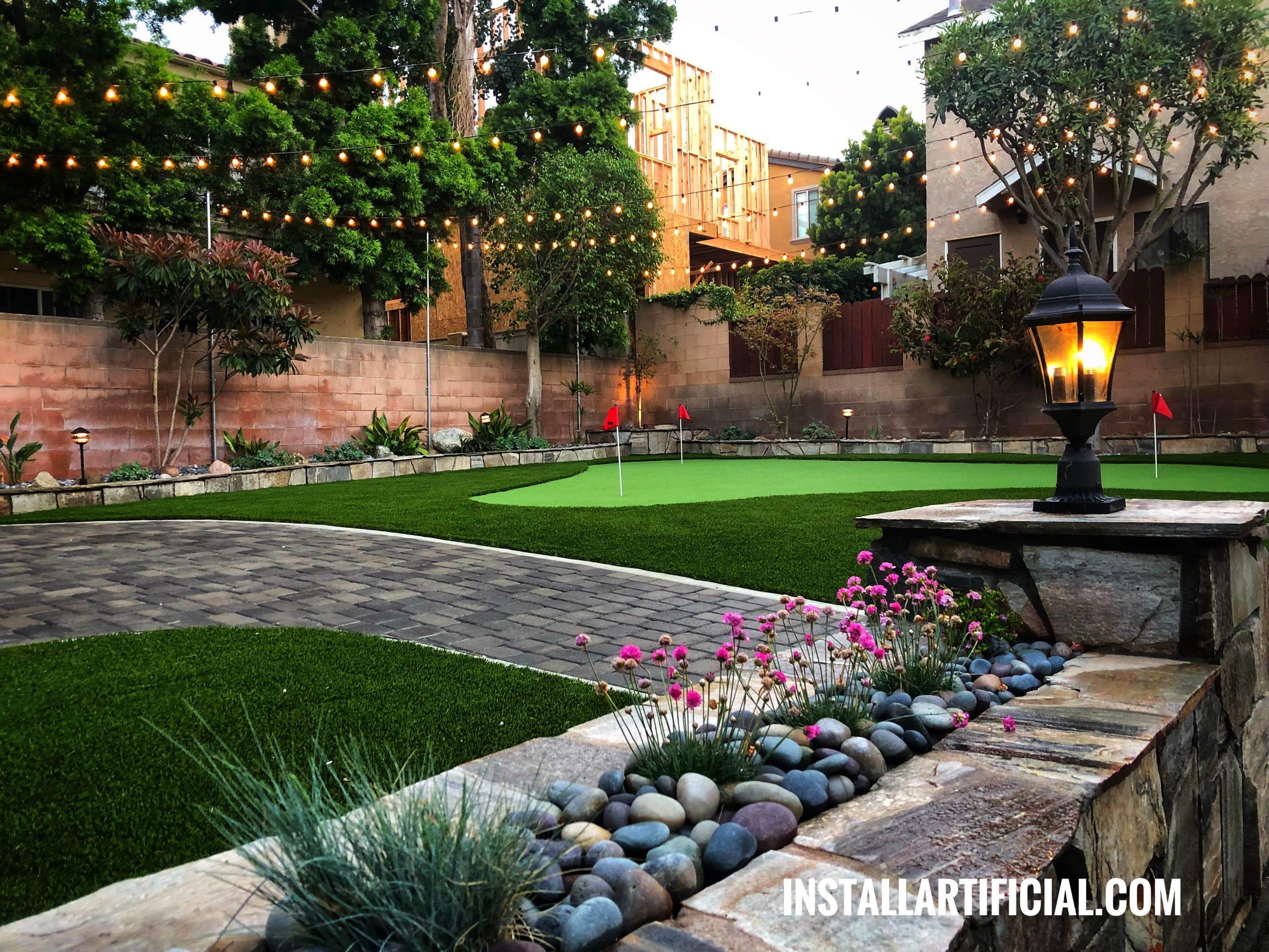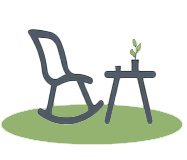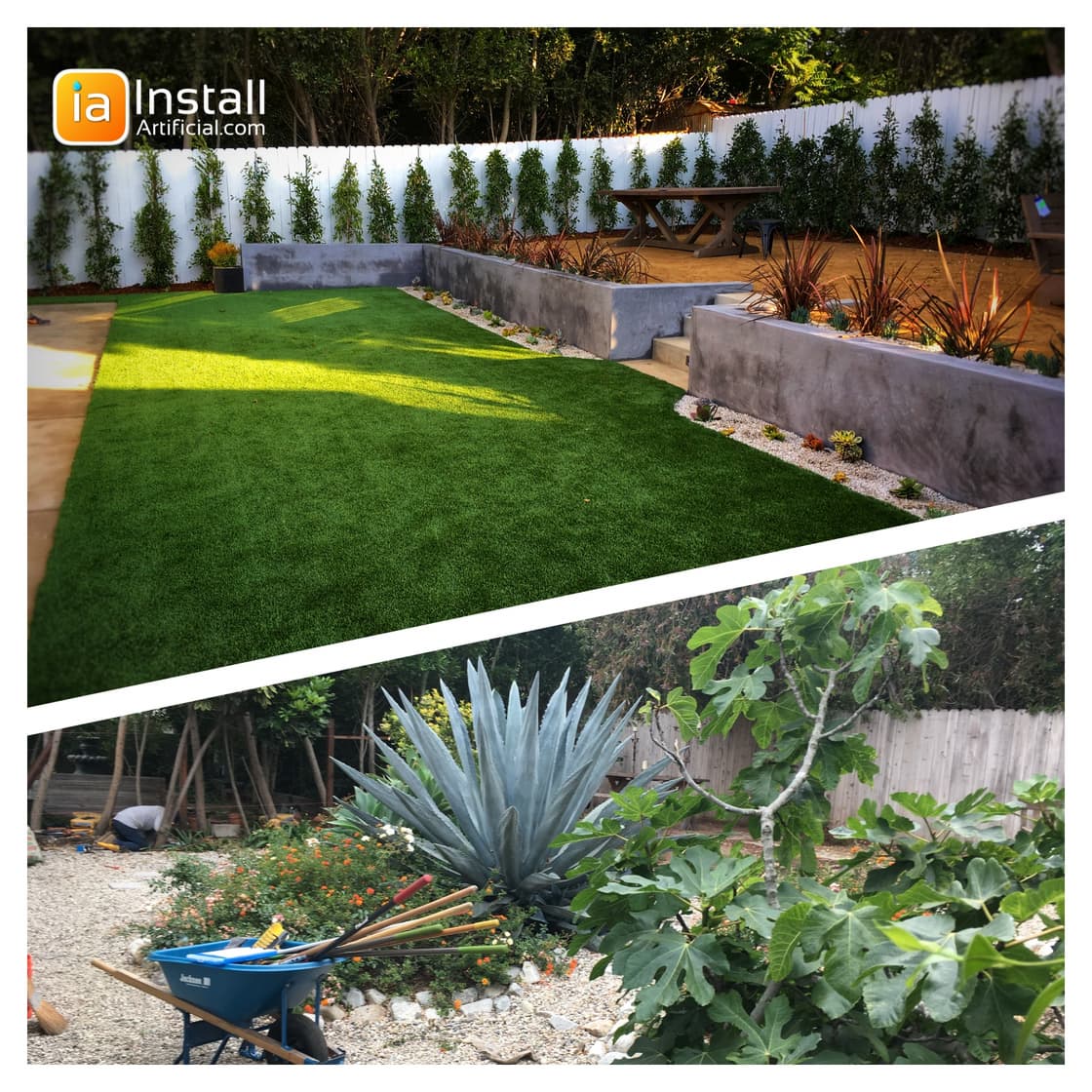Backyard landscape design renovation transforms outdoor spaces into functional and aesthetic areas. It enhances property value and personal enjoyment.
A well-designed backyard offers a perfect blend of beauty and utility. Start by assessing your space and envisioning its potential. Consider elements like plants, pathways, seating areas, and water features. Integrate sustainable practices such as native plants and efficient irrigation systems.
Lighting adds ambiance and extends usability into the evening. Personalize the design to reflect your taste and lifestyle. Professional help can ensure a cohesive and polished result. A thoughtfully renovated backyard becomes an extension of your home, providing a serene retreat and a venue for gatherings.

Credit: www.installartificial.com
Introduction To Backyard Renovation
Renovating your backyard can transform your home. A well-designed backyard provides a peaceful retreat. It adds beauty and value to your property. The process starts with understanding the basics of backyard renovation.
The Value Of Outdoor Spaces
Outdoor spaces are more than just a yard. They are extensions of your home. Well-maintained outdoor areas offer several benefits:
- Increased property value
- Enhanced curb appeal
- Additional living space
- Improved mental health
Spending time outside reduces stress. It provides a place for relaxation and entertainment. A beautiful backyard invites friends and family to gather.
Goals For Your Landscape Transformation
Setting clear goals is essential for a successful renovation. Consider what you want to achieve:
- Functional Spaces: Do you need areas for dining, playing, or gardening?
- Aesthetic Appeal: What style or theme do you prefer?
- Sustainability: Are you interested in eco-friendly options?
- Maintenance Level: How much time can you dedicate to upkeep?
Define your priorities. Balance functionality with beauty. Tailor the design to your lifestyle and preferences. Create a space that brings joy and comfort.

Credit: www.pinterest.com
Planning Your Landscape Redesign
Transforming your backyard can be an exciting project. A well-thought-out plan is crucial for success. By assessing your current space and setting a budget, you can ensure a smooth renovation process.
Assessing Your Current Space
First, evaluate your backyard’s current state. Take note of the existing layout, plants, and structures. Identify areas that need improvement or change. Consider the following:
- Size and shape of the yard
- Sunlight and shade patterns
- Soil type and quality
- Existing plants and trees
- Drainage and water flow
Understanding these factors helps in creating a practical redesign plan.
Setting A Budget For Renovation
Creating a budget is essential for any landscape redesign. Determine how much you are willing to spend on the project. Break down the expenses into categories:
| Expense Category | Estimated Cost |
|---|---|
| Plants and Trees | $500 – $2,000 |
| Hardscape (Patios, Paths) | $1,000 – $5,000 |
| Outdoor Furniture | $300 – $2,000 |
| Lighting | $100 – $1,000 |
| Labor Costs | $500 – $3,000 |
A detailed budget helps in managing expenses and avoiding overspending.
Remember, planning is the key to a successful backyard landscape redesign. Assess your space and set a realistic budget.
Design Elements To Consider
Renovating your backyard landscape is an exciting project. It can transform your outdoor space into a beautiful haven. However, it’s important to consider several key design elements. These elements will ensure your backyard is both functional and aesthetically pleasing.
Choosing A Theme Or Style
The first step in your renovation should be choosing a theme or style. A consistent theme brings harmony to the space. It can be modern, rustic, or tropical. The theme should reflect your personal taste and complement your home’s architecture.
Modern designs often use clean lines and neutral colors. Rustic styles incorporate natural materials like wood and stone. For a tropical theme, think lush greenery and vibrant flowers.
Make a list of elements you want to include:
- Furniture
- Plants
- Decorative items
Incorporating Functional Zones
Creating functional zones in your backyard is essential. This ensures each area serves a specific purpose. Think about how you will use the space. Do you need a dining area, a play zone, or a garden?
Here’s a simple table to help you plan:
| Zone | Purpose | Elements to Include |
|---|---|---|
| Dining Area | Eating and entertaining | Table, chairs, BBQ grill |
| Play Zone | Children’s play | Swings, sandbox |
| Garden | Plant growth | Flower beds, vegetable patches |
Each zone should be clearly defined. Use pathways, plants, or furniture to separate them. This creates a well-organized and practical backyard.

Credit: www.facebook.com
Selecting Plants And Materials
Choosing the right plants and materials is crucial for a stunning backyard. This section will guide you through selecting drought-tolerant plants and sustainable materials. Both choices will ensure a beautiful and eco-friendly landscape.
Choosing Drought-tolerant Plants
Drought-tolerant plants save water and thrive in dry climates. They require less maintenance and can endure prolonged periods without water. Here are some popular drought-tolerant plants:
- Lavender: A fragrant plant with purple flowers.
- Succulents: Plants with thick, fleshy leaves.
- Sage: An herb with silver-green leaves.
- Yarrow: A plant with small, clustered flowers.
Using these plants reduces your water bill and contributes to a sustainable garden.
Sustainable Materials For Eco-friendly Design
Sustainable materials are essential for an eco-friendly backyard. They minimize environmental impact and promote healthy ecosystems. Here are some sustainable materials to consider:
| Material | Description | Benefits |
|---|---|---|
| Recycled Wood | Wood from old buildings or furniture | Reduces deforestation |
| Compost | Organic waste turned into soil | Enriches garden soil |
| Gravel | Small stones used for paths | Promotes water drainage |
| Recycled Plastic | Plastic waste repurposed into furniture | Reduces landfill waste |
Choosing these materials supports sustainability and helps protect the environment.
Hardscaping Ideas For Structure
Creating a beautiful backyard involves more than just plants and flowers. Hardscaping adds structure and functionality to your outdoor space. It includes elements like patios, walkways, retaining walls, and steps. These features enhance the beauty and usability of your backyard.
Integrating Patios And Walkways
Patios provide a place to relax and entertain guests. Choose durable materials like stone, brick, or concrete for your patio. These materials offer longevity and low maintenance.
Walkways connect different areas of your backyard. They guide visitors and prevent soil erosion. Use materials like gravel, pavers, or flagstone to create stylish and functional paths.
| Material | Benefits |
|---|---|
| Stone | Durable and classic look |
| Brick | Timeless and versatile |
| Concrete | Cost-effective and customizable |
Adding Retaining Walls And Steps
Retaining walls hold back soil and create level areas. They prevent erosion and add visual interest. Use materials like stone, wood, or concrete blocks. These materials are strong and long-lasting.
Steps make navigating your backyard easier. They connect different elevation levels. Choose materials that match your retaining walls for a cohesive look.
- Stone: Natural and durable
- Wood: Warm and inviting
- Concrete Blocks: Strong and versatile
Adding these hardscaping features transforms your backyard into a functional and beautiful space. They provide structure, prevent erosion, and enhance usability. Start planning your backyard renovation today!
Water Features And Lighting
Transforming your backyard with water features and lighting can create a serene and inviting atmosphere. These elements enhance your outdoor space’s beauty and functionality, making it a perfect place for relaxation and entertainment.
Incorporating Ponds And Fountains
Ponds and fountains bring nature’s tranquility to your backyard. The sound of flowing water can be very calming. A pond can house fish and aquatic plants, adding life and color.
- Ponds – Create a natural look with rocks and plants.
- Fountains – Add a focal point with a stylish water feature.
Consider the size of your space before installing these features. Small yards may benefit from compact fountains, while larger areas can accommodate expansive ponds.
Outdoor Lighting For Ambiance And Safety
Effective outdoor lighting enhances the beauty and safety of your backyard. It allows you to enjoy the space even after sunset.
Use lights to highlight pathways and features. This helps prevent trips and falls.
| Lighting Type | Purpose |
|---|---|
| Pathway Lights | Illuminate walkways and driveways |
| Spotlights | Highlight specific features like trees or statues |
| String Lights | Create a festive and cozy atmosphere |
Choose energy-efficient LED lights. They last longer and are environmentally friendly. Solar-powered lights are also a great option. They save on electricity and are easy to install.
Outdoor Living Spaces
Transforming your backyard into a functional and beautiful space can enhance your outdoor experience. Outdoor living spaces allow you to enjoy nature while still having the comforts of home. From cooking to relaxing, these spaces can cater to all your needs. Let’s explore some ideas to make your backyard a perfect retreat.
Designing An Outdoor Kitchen
An outdoor kitchen can be a game-changer. It allows you to cook and entertain without leaving your guests. Here are some key elements to consider:
- Grill and Cooking Area: Choose a high-quality grill. You might also want a pizza oven.
- Counter Space: Ample counter space is vital. It helps in food prep and serving.
- Storage: Include cabinets and shelves. They keep utensils and ingredients handy.
- Sink: A sink makes cleaning up easy. It’s a must-have for any outdoor kitchen.
- Refrigeration: A mini-fridge or cooler keeps drinks and perishables cool.
Designing an outdoor kitchen requires planning. Think about your needs and space. Make it functional and attractive.
Creating Cozy Seating Areas
Comfortable seating areas make your backyard inviting. Here are some ideas to create cozy spots:
- Outdoor Sofas and Chairs: Opt for weather-resistant furniture. Cushions add extra comfort.
- Fire Pit: A fire pit can be a focal point. It provides warmth and ambiance.
- Shade: Use umbrellas or pergolas. They offer relief from the sun.
- Lighting: String lights or lanterns create a magical atmosphere. Lighting extends usability into the evening.
- Rugs and Pillows: Outdoor rugs define the space. Pillows add a pop of color and comfort.
Seating areas should be well-planned. They should offer comfort and style. Enjoy your outdoor space day and night.
Executing The Renovation Plan
Transforming your backyard into a stunning landscape requires a solid plan. This stage involves taking your design ideas and making them a reality. Let’s explore key aspects of executing your backyard renovation plan.
Diy Vs. Hiring Professionals
Deciding between DIY and hiring professionals is crucial. DIY projects can save money but require time and effort. If you love hands-on work, DIY might be a great choice.
On the other hand, hiring professionals brings expertise and efficiency. Professionals handle complex tasks and ensure high-quality results. Here’s a quick comparison:
| Aspect | DIY | Hiring Professionals |
|---|---|---|
| Cost | Lower | Higher |
| Time | Longer | Shorter |
| Expertise | Requires Learning | High |
| Quality | Varies | Consistent |
Maintaining Your New Backyard Landscape
Once the renovation is complete, maintenance becomes essential. Regular upkeep ensures your backyard remains beautiful and functional.
- Watering: Ensure plants receive adequate water, especially during dry periods.
- Pruning: Trim plants to keep them healthy and well-shaped.
- Weeding: Remove weeds to prevent them from choking your plants.
- Fertilizing: Use appropriate fertilizers to nourish your soil and plants.
Consider setting a maintenance schedule to keep track of these tasks. This way, your new landscape will stay vibrant and lush throughout the seasons.
Frequently Asked Questions
Is There An App To Design Your Backyard?
Yes, several apps can help design your backyard. Popular options include iScape, Home Design 3D, and SketchUp. These tools offer user-friendly interfaces and various features to visualize and plan your outdoor space effectively.
How Much Should You Spend On A Backyard Remodel?
Budget for a backyard remodel ranges from $5,000 to $50,000. Costs vary based on size, materials, and design complexity.
How Do I Make My Backyard Look Professionally Landscaped?
To make your backyard look professionally landscaped, use a mix of plants, install a focal point, add lighting, maintain the lawn, and use mulch.
How To Transform A Boring Backyard?
Transform a boring backyard by adding colorful plants, comfortable seating, and outdoor lighting. Install a fire pit or water feature. Create designated zones for dining and relaxation. Use potted plants and garden art for visual interest. Regularly maintain and update your space to keep it inviting.
Conclusion
Transforming your backyard landscape can truly elevate your outdoor living experience. With careful planning and creativity, you can achieve stunning results. Remember to focus on functionality and aesthetics. Keep your personal style in mind. Happy renovating, and enjoy your beautiful new backyard oasis!

